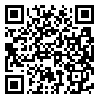Volume 6, Issue 172 (3-2023)
J Except Educ 1401, __(172): 91-91 |
Back to browse issues page
Download citation:
BibTeX | RIS | EndNote | Medlars | ProCite | Reference Manager | RefWorks
Send citation to:



BibTeX | RIS | EndNote | Medlars | ProCite | Reference Manager | RefWorks
Send citation to:
Ahmadian R, Hosseini Nesab S D, Azmodeh M. Comparing the effectiveness of strengthening working
memory and critical thinking training on emotion regulation
strategies of children with special learning disorder. J Except Educ 2023; 6 (172) : 2
URL: http://exceptionaleducation.ir/article-1-2541-en.html
URL: http://exceptionaleducation.ir/article-1-2541-en.html
1- Islamic Azad University, Tabriz, Iran
2- Islamic Azad University, Tabriz, Iran ,d.hosseininasab@gmail.com
2- Islamic Azad University, Tabriz, Iran ,
Abstract: (2014 Views)
Abstract
Objective: To compare the effectiveness of memory work and critical thinking training of children's
movement regulation with special methods.
Method: The current research was a semi-experimental research with a pre-test, post-test and control
group design. The statistical population included all students aged 9 to 12 who referred to the center for
special problems in Tabriz district in 2021. Among these, 60 people were selected by purposive sampling
and randomly assigned to two experimental groups and one control group. The tools used in the research
were Garnevsky's cognitive emotion regulation strategies questionnaire, children's version, along with the
implementation protocol of interventions to strengthen working memory and critical thinking training. In
order to analyze data from covariance and multivariate covariance, hypotheses were analyzed.
Findings: Examining the effect size showed that the biggest difference is in the re-evaluation strategy
with a coefficient of 0.347 and the positive re-selection strategy with a coefficient of 0.254. The trained
examinees found that the two components of positive re-examination and positive re-evaluation in the
critical thinking group were significantly different from the memory enhancement group, and it can also be
said that the three components of self-blame, skepticism, and catastrophizing in the critical thinking group
mean less than the working memory enhancement group. was (p>0.05).
Conclusion: In the critical thinking group, the use of adaptive strategies (positive refocusing and positive
re-examination) increased significantly and there are significant differences between the effectiveness of
critical thinking training and strengthening memories to increase the use of adaptive strategies and decrease
the use of maladaptive cognitive-emotional regulation strategies.
Objective: To compare the effectiveness of memory work and critical thinking training of children's
movement regulation with special methods.
Method: The current research was a semi-experimental research with a pre-test, post-test and control
group design. The statistical population included all students aged 9 to 12 who referred to the center for
special problems in Tabriz district in 2021. Among these, 60 people were selected by purposive sampling
and randomly assigned to two experimental groups and one control group. The tools used in the research
were Garnevsky's cognitive emotion regulation strategies questionnaire, children's version, along with the
implementation protocol of interventions to strengthen working memory and critical thinking training. In
order to analyze data from covariance and multivariate covariance, hypotheses were analyzed.
Findings: Examining the effect size showed that the biggest difference is in the re-evaluation strategy
with a coefficient of 0.347 and the positive re-selection strategy with a coefficient of 0.254. The trained
examinees found that the two components of positive re-examination and positive re-evaluation in the
critical thinking group were significantly different from the memory enhancement group, and it can also be
said that the three components of self-blame, skepticism, and catastrophizing in the critical thinking group
mean less than the working memory enhancement group. was (p>0.05).
Conclusion: In the critical thinking group, the use of adaptive strategies (positive refocusing and positive
re-examination) increased significantly and there are significant differences between the effectiveness of
critical thinking training and strengthening memories to increase the use of adaptive strategies and decrease
the use of maladaptive cognitive-emotional regulation strategies.
Article number: 2
Keywords: Critical thinking, emotion regulation strategies, specific learning disorder, working memory
Type of Study: Original Article |
Subject:
مشکلات یادگیری
Received: 2022/Oct/Sat | Revised: 2023/Jun/Sat | Accepted: 2023/Jan/Sat | Published: 2023/Apr/Sat | ePublished: 2023/Apr/Sat
Received: 2022/Oct/Sat | Revised: 2023/Jun/Sat | Accepted: 2023/Jan/Sat | Published: 2023/Apr/Sat | ePublished: 2023/Apr/Sat
Send email to the article author
| Rights and permissions | |
 |
This work is licensed under a Creative Commons Attribution-NonCommercial 4.0 International License. |





